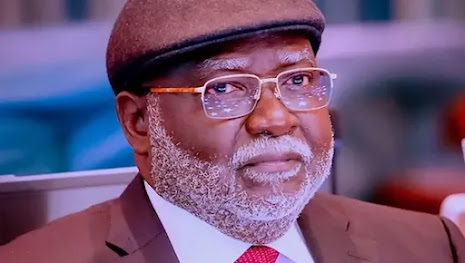Lillian Okenwa writes that the Nigerian justice system needs to be quickly overhauled. On January 28, 2013, an Abuja High Court exposed the hypocrisy of the Nigerian justice system when it sentenced John Yakubu Yusufu, who was on trial for stealing N32.8 billion in the Police Pension scam, to two years in prison on each of three charges and then offered him the option of paying N250,000 for each count. The former Police Pension Office Assistant Director simply paid the N750,000 fine and left. However, an appeal was made by the Economic and Financial Crimes Commission (EFCC).
Justice Emmanuel Agim of the Appeal Court, as he was at the time, made the following remarks in his judgment: “The ridiculously low monetary sentence as against the mind-blowing and massive amount of over N24 billion stolen helps the convict to effortlessly pay the fine and avoid the pain of punishment for his crime while retaining the proceeds of his crime…” Then in April 2022, when President Muhammadu Buhari granted state pardon to Joshua Dariye and Jolly Nyame, former governors of Plateau and Taraba states who had been convicted for stealing N1.16 billion and N1.6 billion, respectively, from their
According to Falana, citizens were entitled to equal rights and opportunities under Section 17 of the 1999 Constitution, so all prisoners serving time for theft ought to receive state pardons.
Prior to these, the EFCC indicted Lucky Igbinedion, a former governor of Edo State, in January 2008 for stealing more than $25 million in public funds. In the end, he admitted guilt. In 2008, he and his company were found guilty of 27 counts of money laundering. The trial judge, Abdullahi Kafarati, imposed a light sentence that did not include time in jail. Igbinedion walked away after paying the equivalent of a N3 million fine and agreeing to forfeit some of his assets.
A few days ago, helpless Nigerians were shocked by the mind-boggling death sentence handed down to a 32-year-old vulcaniser by an Ikeja Special Offences Court presided over by Justice Mojisola Dada for stealing N57,000. While wealthy thieves continue to receive slaps on the wrist, Chidozie Onyinchiz was convicted of robbing a nurse of N57,000 and was given the death penalty by hanging. Nigerians, in a state of bewilderment, are asking: Why are politicians and public servants allowed to go free when they have over the years impoverished Nigerians and literally taken their lives?
The convict’s attempt to escape the charges, according to Justice Dada, was fruitless. She claimed that the reason for this was that he had previously informed the police at Igando, Lagos, that his victim, Veronica Uwayzor, had seen him and that the two of them recognized each other at the time of the crime.
Justice Dada claims that: At the Akesan Bus Stop, the defendant claimed that the complainant pointed at him as one of the boys armed with scissors and forcefully took her bag containing N57,000. The complainant had stated that, a few hours after the robbery, neither the defendant nor his accomplice, Ediri Endurance, who is still at large, wore masks that made it easy for her to recognize Onyinchiz. “The totality of the evidence before the court is compelling and I find the defendant guilty of the charges preferred against him,” the defendant stated in his initial statement at Igando Police Station. May God have mercy on his soul as he is executed by hanging as a result of this sentence.
As a result, the thieving vulcaniser will be hanged violently, while those who have enriched themselves through outright theft of public funds and brazenly weaponized poverty will be praised. However, a former Civil Liberties Organization President, Ayo Obe, made the observation that “it was the armed robbery element that attracted the (mandatory) death penalty, rather than the amount stolen.” Furthermore, since the ruling class makes laws to strengthen their position in society, these powerful people make, amend, review, and generally tinker with laws to protect their own interests. Privileged thieves also carry computers and pens, which are oddly not considered weapons.
People are arrested at random every day and taken to overcrowded prisons for laughable reasons, while known criminals are left alone. The largest number of Awaiting Trial Inmates (ATIs) in the nation are members of this group. One of those unfortunate Nigerians was Ola, a panel beater who was recently released from prison after serving eight years for failing to stop suspected criminals being pursued by soldiers in Lagos. He was charged with armed robbery when the soldiers eventually handed him over to the police.
Returning to the subject of high-profile crimes, Socio-Economic Rights and Accountability Project (SERAP), an anti-corruption watchdog, filed an action in August 2021 at the Federal High Court in Abuja to challenge the failure of anti-graft agencies to effectively check massive corruption in government. The group claimed that this had hampered the government’s ability to meet the needs of citizens.
The Human and Environmental Development Agenda (HEDA Resource Centre), a different organization, threatened to sue the Association of National Accountants of Nigeria in December 2022 for failing to investigate and sanction the suspended Accountant General of the Federation, Idris Ahmed, who is being prosecuted by the EFCC for the alleged fraud of N80 billion. Numerous Nigerians are anxiously awaiting the outcome. In the meantime, people who steal little things are being told to get out of this world just for using scissors, which are a ridiculous weapon. The prisons are also getting bigger thanks to some of their fortunate compatriots.
“Criminal conversion of billions is worse than armed robbery,” Falana stated. In his 1974 album “Authority Stealing,” Fela sang, “pen robbery is worse than armed robbery.” Today, armed robbery, unemployment, and poverty are paved by the few who steal the billions intended for development.
The Criminal Code, which applies to Nigeria’s southern states, and the Penal Code, which applies to Nigeria’s northern states, are currently the two primary pieces of criminal law in Nigeria. These two laws, which were passed in 1960 and 1902, respectively, are now extremely out of date. The EFCC and ICPC, among others, joined the criminal justice system in 1999. However, these organizations concentrate on corruption-related issues.
Despite this, the time to reform the criminal justice system is now more than ever. The Nigerian law Reform Commission (NLRC), whose responsibility it is to reform and update outmoded laws, needs to step up to its responsibility now more than ever.
• Okenwa is a lawyer, journalist, and Law & Society Magazine’s publisher.


